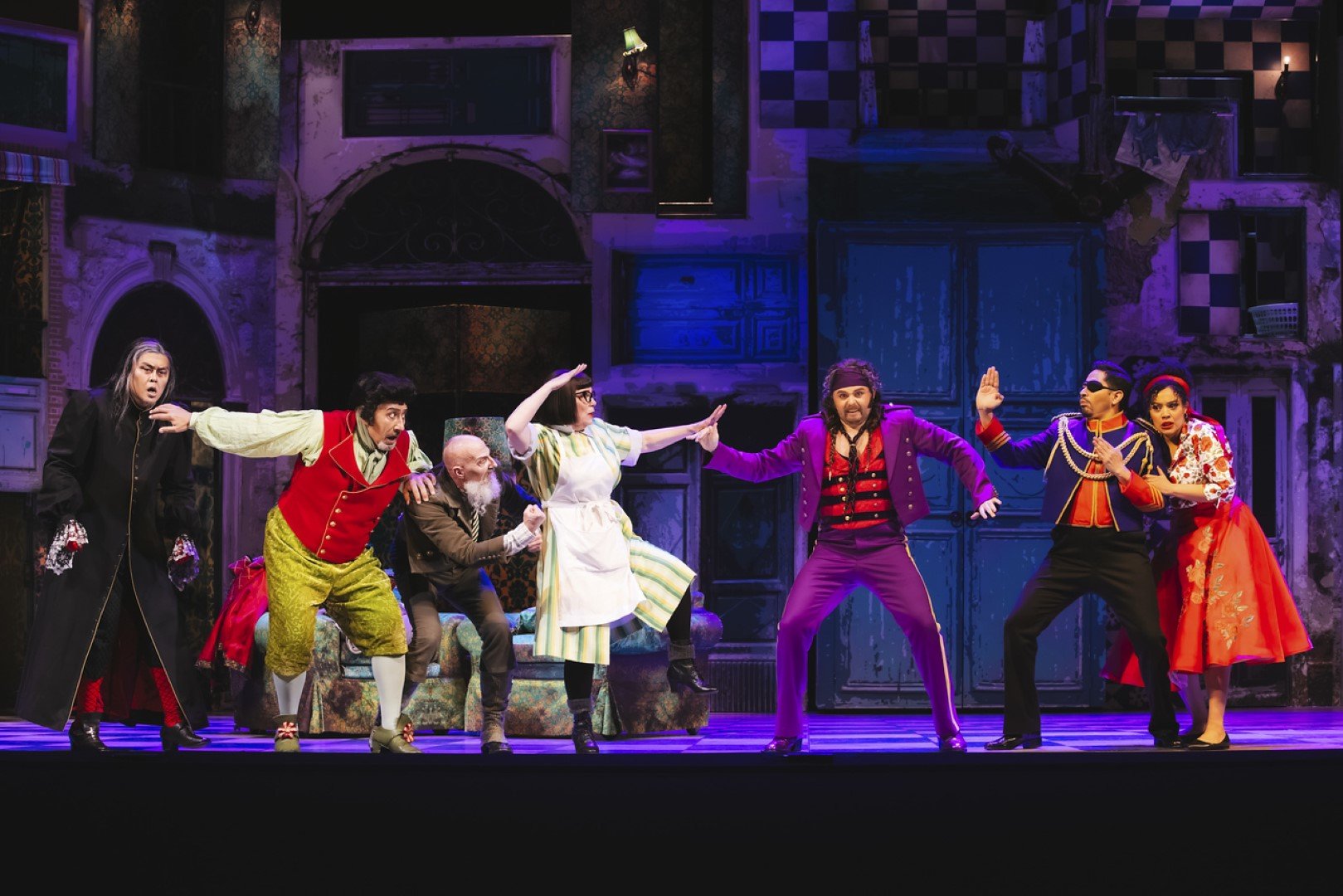A Delightful 'Barber' and a Powerhouse Gala in Seattle
/By Truman C. Wang
5/15/2024
Photo credit: Sunny Martini
The Seattle Opera concluded its 2023/24 season with a delightful production of Barber of Seville, directed by Lindy Hume. I attended the Friday, May 10 performance. Director Hume handled her madcap cast of singers, choristers and supers with the skill of a Howard Hawks romantic screwball comedy, against a colorful backdrop of circus-like sets and costumes, complete with a balloon and a red-nosed clown, missing only the lions and elephants. There were parodies or just straight-up farce: Rosina bumping into an indignant Berta (a parody of Susanna and Marcellina’s scene from Marriage of Figaro), a Covid parody incorporated into the very funny music lesson scene with a ‘very sick’ Basilio and Ambrogio wearing a face mask and spraying the house with Lysol, a hilarious farce with the oversexed Berta and Ambrogio after the storm, and the merry list goes on. There were memorable stage pictures, too many to mention, the best of all being the Spanish fandango finale that was a stroke of directorial genius.






The bubbly cast seemed to be selected for their acting rather than vocal abilities. The singers, including the chorus, were often seen jumping, running, miming, or tossing stuff around (such as a hairy stuffed dog that squealed). William Guanbo Su, the Basilio (basso buffo), was vocally the most refined and accomplished, singing a thrilling calumny aria. Kevin Burdette’s Bartolo (basso cantante) was a complete clown of a doctor, unable to deliver the vocal goods in his aria in act one or in the music lesson. Sean Michael Plumb, the Figaro, made his entrance in the auditorium and ran up the stage to begin his “Largo al factotum”; he was fine, albeit without the supple, individual inflections of the best Figaros. Megan Moore gave Rosina some well-turned phrases and new embellishments in her “Una voce poco fa” with impressive low notes but brittle highs. Duke Kim was an ardent and noble Almaviva, but was deprived of his final aria "Cessa di più resistere". Thanks to director Hume, Deanne Meek’s Berta was a surprise hit for a substantial acting role and a well-sung, lavishly-embellished aria. Hailing from Florence, Italian conductor Valentina Peleggi was high-spirited and showed a real affinity for the Rossini style of grace, pace and joie de vivre.
Four more performances of Barber of Seville at the McCaw Hall on May 15, 17, 18, 19.
The next day, May 11, was a gala concert at McCaw Hall celebrating Seattle Opera’s 60th anniversary (Tosca was the inaugural opera on May 7, 1964.) Sixty years is long for a U.S. opera company, the first fifty years of which, remarkably, were helmed by only two General Directors – Glynn Ross (1963-1983) and Speight Jenkins (1983-2014) – who in 1975 put Seattle on the map as the ‘Bayreuth of the West’. (Mr. Ross had assisted Wieland and Wolfgang Wagner at the reopened Festspielhaus in the ‘50’s.) The last ten years saw the company steering away from its Wagnerian heritage and toward new American operas; so far the efforts have proven successful.
Americans dominated the two-hour opera gala, including two of today’s finest Wagnerians: Greer Grimsley, who delivered an impassioned Wotan’s Farewell, and a thrilling D-natural in “Some Enchanted Evening”; and Mary Elizabeth Williams, who tore up Bess’ “My man’s gone now” and then proceeded to show her bel canto chops in Bellini’s Norma – both artists got their start in Seattle. Their fine singing was a reminder that Wagner and bel canto singing need not be mutually exclusive, despite the Meister’s diatribe against the Italians.
Americans also excelled in Italian comedies and tragedies. Ginger Costa-Jackson was the very funny Italian girl (in Algiers) to Adam Lau’s Mustafa in the zany duet “O che muso” from Rossini’s comedy, Sarah Coburn and John Moore also delighted in their comedic duet from Don Pasquale. As a tragedienne, Ms. Coburn plumbed the emotional depths of Nedda (a foretaste of next season opener Pagliacci) and sailed the stormy, fateful high seas of Lucia’s Mad Scene.
Other memorable numbers were Romeo’s aria by Korean tenor Duke Kim, “Una furtiva lagrime” by New Zealander Amitai Pati, and an explosive, powerhouse trio “Vanne, si mi lascia, indegno” from Bellini’s Norma. Kazem Abdullah conducted the Seattle Symphony in the pit, a true singers’ conductor (perfect rapport in “Mira o Norma”) with a keen ear for detail. The excellent Seattle Opera Chorus started and ended the concert, appropriately, with Wagner – Entry of the Guests and Pilgrims’ Chorus from Tannhäuser. The star-studded lineup all returned for a final Brindisi from La Traviata. (It’s a nice change to hear Wagnerian voices singing Violetta and Alfredo!)
Seattle Opera’s 2024/25 season will open August 3 with Pagliacci.
Truman C. Wang is Editor-in-Chief of Classical Voice, whose articles have appeared in the Pasadena Star-News, San Gabriel Valley Tribune, other Southern California publications, as well as the Hawaiian Chinese Daily. He studied Integrative Biology and Music at U.C. Berkeley.






